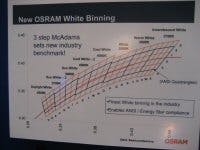The new binning process for white LEDs corresponds to a 3-step McAdam ellipse and is available for the Power TopLED, Advanced Power TopLED and Dragon product families.
With precisely defined color coordinates, the intention is that different LEDs within one white group reliably emit the same homogenous white light – with no visible color deviations.
The binning scheme is related to the ANSI chromaticity specification (not yet finally approved), which will also be included with the Energy Star requirements for solid-state lighting products. This standard defines 8 correlated color temperatures for white LEDs, based on 7-step McAdam ellipses (see for example Standards required for further penetration of solid state lighting).
Osram has further sub-divided the ANSI bins creating a total of 120 sub-bins. As well as being sub-divided by CCT, the bins also extend further from the blackbody curve, into regions where white LEDs can have a noticeable pinkish or greenish tinge.
Osram says that its new binning structure delivers significant improvements in off-angle color uniformity as well as a typical color rendering index (CRI) of 80+.
The color homogeneity of volume-casted Power TopLEDs has been improved over the entire range of viewing angles. Up to now, these LEDs appeared to have a slightly different white tone when viewed from different angles, due to the way in which the phosphor was distributed in the package.
The company says that its new fine white binning scheme makes it "easier and potentially more cost-effective to build lighting applications with the highest requirements in uniformity."






